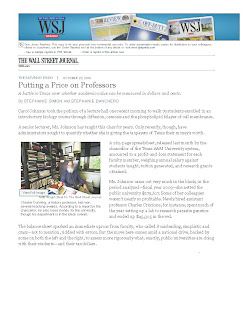DISCLAIMER: THE HYPOTHETICAL SITUATION DEPICTED IN THIS BLOG ENTRY IS TOTALLY FICTIONAL. ANY SEMBLANCE TO EVENTS OR PERSONS, REAL OR IMAGINED, IS ENTIRELY COINCIDENTAL. Liberal Education is based on the ideal of rational study without prejudice—that is, the dispassionate evaluation of a topic with an open mind without pre judgment. Though I myself continually fall short of achieving this ideal, Liberal Education has provided the framework for my entire academic career, both as professor and as director of the ethics center. In open public forums on controversial—hence, in my view, interesting —topics, Faculty have the responsibility to serve as exemplars of the ideal of Liberal Education. One way Faculty can discharge this responsibility in open pubic discussion is to demonstrate an understanding of the fundamentals of a speaker’s argument, and then point to potential problems with that argument. In fact, this is what we expect of good students. The worst example a Faculty can set i...
